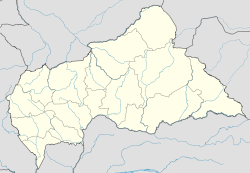Boali
 From Wikipedia the free encyclopedia
From Wikipedia the free encyclopedia
Boali | |
|---|---|
 The Falls of Boali | |
| Coordinates: 4°48′N 18°7′E / 4.800°N 18.117°E | |
| Country | Central African Republic |
| Prefecture | Ombella-M'Poko |
| Government | |
| • Sub-Prefect | Solange Mokolomboka Soza Makanda[1] |
| • Mayor | Pierre Poutou[2] |
| Population (2012)[3] | |
| • Total | 9,314 |
Boali is a town located in the Central African Republic prefecture of Ombella-M'Poko.
Boali is located on National Highway 1 (RN1),[4] about 100 km northwest of the national capital, Bangui.[5] The road, one of the country's few paved highways, leads on to Bouar, and ultimately to Cameroon.[6]
Situated on the Mbali River, Boali is noted for its waterfalls and for the nearby hydroelectric works. The Falls of Boali are 250 m wide and 50 m high, and are a popular tourist destination.[6]
The two units of the Boali Hydroelectric Power Station, Boali I and Boali II, are located below the falls. They have a combined generating power of 18.65 megawatts, and are operated by the state-run Enerca.[7] The completion of Boali I in the 1950s spurred several other industrial developments in the town, including the country's first textile mill, which began operating in 1954.[8]
The Boali hydroelectric works supply power to the capital and 13 other towns.[7]
History
[edit]Initial arrangements were made in 2010 for a third hydroelectric plant, Boali 3, to be built with Chinese assistance.[9]
Civil war
[edit]This strategic role was used by the Seleka rebels in March 2013, who took over the plant on their way to Bangui and shut off power to the city.[10] On 17 January 2014 Séléka withdrew from Boali. 300 anti-Balaka fighters entered town killing four civilians[11] On 5 December 2015 the city was recaptured by government forces.[12]
On 24 December 2020 rebels from Coalition of Patriots for Change attacked Boali.[13] They were pushed back by government forces on 11 January 2021.[14]
References
[edit]- ^ Oubangui Medias, Oubangui Medias. "Centrafrique : Décrets portant nomination des Gouverneurs, des Préfets et des Sous-Préfets". oubanguimedias.com. Oubangui Medias. Retrieved 5 June 2024.
- ^ "Transhumance : "Pour nous, la conciliation doit primer entre les parties"". 22 February 2022.
- ^ "World Gazetteer". Archived from the original on 2013-01-11.
- ^ "Les Chutes de Boali". BanguiWeb. Archived from the original on 2013-04-10. Retrieved 2013-03-24.
- ^ O'Toole, Thomas (1986). The Central African Republic The Continent's Hidden Heart. Westview Press. p. 123.
- ^ a b Auzias, Dominique; Labourdette, Jean-Paul (2010). "Chutes de Boali". République Centrafricaine 2010-11. Petit Futé. p. 110. ISBN 2746926075.
- ^ a b Kalck, Pierre (2004). Historical Dictionary of the Central African Republic Third Edition. Scarecrow Press. ISBN 0810849135.
- ^ Singh, Daleep (2008). Francophone Africa, 1905-2005 A Century of Economic and Social Change. Allied Publishers. p. 201. ISBN 8184242581.
- ^ "China and Central Africa". Ministry of Foreign Affairs of the People's Republic of China. Retrieved 2013-03-24.
- ^ "Séléka conquiert enfin la ville de Bangui, les FACA battent en retraite". Radio Ndeke Luka. 2013-03-23. Retrieved 2013-03-24.
- ^ "Final report of the International Commission of Inquiry on the Central African Republic".
- ^ "Boali: les FACA gagnent du terrain". 10 December 2015.
- ^ "RCA : Boali, les forces gouvernementales encerclées par les rebelles". 24 December 2020.
- ^ "Army, UN forces repel two rebel attacks in Central African Republic". 11 January 2021.

